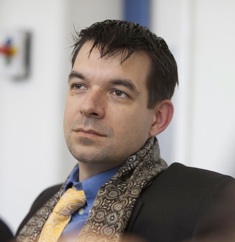
Dr. Chad M. Briggs
GlobalInt - Strategy Director
Dr. Briggs is a Principal Consultant with GlobalINT. He has a PhD in political science from Carleton University in Canada, and specializes in climate change, hybrid and cyber conflict, and energy/environmental risk assessments.
He worked as Team Leader under the Energy and Environmental Security Directorate at the US Dept of Energy, and from 2008-2010 was Senior Advisor for International Security Affairs and Special Advisor on Climate Change and Strategic Assessment. He led the Abrupt Climate Change & Security team for DOE, which was tasked with developing methods to assess security risks of abrupt climate changes and communicating these to policymakers.
From 2010-2012 he was Minerva Chair of Energy and Environmental Security at the Air University, United States Air Force, and is more recently a member of the Global Military Advisory Council on Climate Change (GMACCC). Dr. Briggs is a faculty members at Johns Hopkins University and the University of Alaska Anchorage. He has extensive field experience in Kosovo and Ukraine, particularly in areas of energy policy, hybrid warfare, and protection of critical infrastructure. More recently he has lived and worked in Alaska, focusing on emerging climate change risks, including connections to military operations and geophysical risks. Chad has also worked on post-conflict reconstruction and environmental health issues, including extensive fieldwork in Eastern and Southeastern Europe. He has also been a Fulbright Professor to Budapest and Berlin.
In December 1995 I was a graduate student on the west coast of Ireland. Asked to explain why most political experts had failed to predict the fall of the Berlin Wall and end of the Cold War, I kept coming back to the point that there was a mismatch between the information we needed, and what our organizations provided. Having a background in ecology, late on a Saturday night I came to the conclusion that new concepts were needed in policy (eg. networked systems and emergent order), and that early warning of risks could only come from engaging with multiple communities.
Since then, I have spent years working to translate these inherently complex concepts between different groups. Whether trying to explain ‘environmental’ issues in Serbian (where the term does not exist), or understanding that Hungarians can describe scientific bias far more precisely than is possible in English, so too can scientific and political questions mean little if a common language is missing.
In my government, academic and military work, I’ve stepped into others’ shoes and developed ways to bridge the divisions between bureaucratic, scientific and cultural communities. Understanding the future is rarely possible when one’s vision is too focused in one particular area, the most important risks and opportunities can too easily be missed. Our mission is to help others broaden that vision and to manage dangerous uncertainties and avoid strategic surprises.





